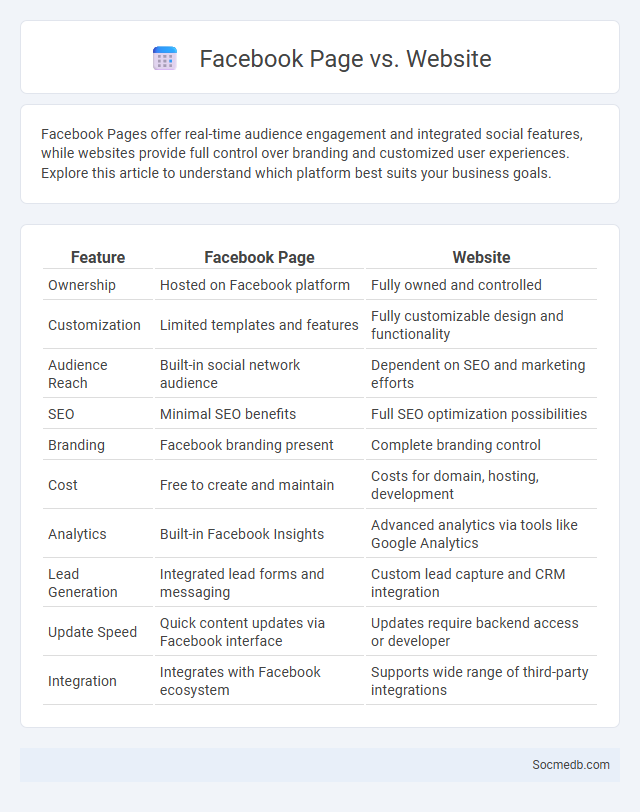
Photo illustration: Facebook Page vs Website
Facebook Pages offer real-time audience engagement and integrated social features, while websites provide full control over branding and customized user experiences. Explore this article to understand which platform best suits your business goals.
Table of Comparison
| Feature | Facebook Page | Website |
|---|---|---|
| Ownership | Hosted on Facebook platform | Fully owned and controlled |
| Customization | Limited templates and features | Fully customizable design and functionality |
| Audience Reach | Built-in social network audience | Dependent on SEO and marketing efforts |
| SEO | Minimal SEO benefits | Full SEO optimization possibilities |
| Branding | Facebook branding present | Complete branding control |
| Cost | Free to create and maintain | Costs for domain, hosting, development |
| Analytics | Built-in Facebook Insights | Advanced analytics via tools like Google Analytics |
| Lead Generation | Integrated lead forms and messaging | Custom lead capture and CRM integration |
| Update Speed | Quick content updates via Facebook interface | Updates require backend access or developer |
| Integration | Integrates with Facebook ecosystem | Supports wide range of third-party integrations |
Introduction to Digital Presence: Facebook Page, Website, and Page
Creating a strong digital presence starts with establishing your Facebook Page, which serves as a dynamic platform to engage your audience and showcase your brand's personality. Your Website acts as the central hub for detailed information, providing credibility and essential services such as e-commerce or customer support. Optimizing both your Facebook Page and Website ensures maximum visibility and drives consistent traffic, empowering you to grow your online influence effectively.
Key Differences Between Facebook Page, Website, and Page
Facebook Pages serve as social media profiles designed for businesses or public figures, offering direct engagement through posts, comments, and likes, while a Website provides a comprehensive platform for detailed content, e-commerce, and full control over branding and functionality. Unlike a personal Facebook Profile, a Facebook Page allows analytics tracking and advertisement integration to boost visibility and reach. Understanding these key differences helps Your online presence strategy by choosing the right platform for community interaction or extensive content delivery.
Advantages of Using a Facebook Page
A Facebook page offers your business enhanced visibility, allowing you to reach millions of potential customers worldwide. Engaging content and targeted ads enable you to build a loyal community while tracking analytics provides valuable insights into audience behavior. Your brand's reputation strengthens through customer interaction, timely responses, and authentic social proof on this dynamic platform.
Benefits of Having a Dedicated Website
A dedicated website enhances your social media presence by providing a centralized platform for showcasing your brand identity, products, and services with full control over content and design. It improves SEO rankings, driving organic traffic and increasing your online visibility beyond social media algorithms' limitations. Your website also enables better customer data collection and engagement opportunities, transforming social interactions into measurable business growth.
What is a "Page" and How Does it Differ?
A social media "Page" serves as a dedicated profile for businesses, brands, or public figures, allowing them to establish a unique online presence separate from personal accounts. Unlike personal profiles, Pages offer advanced tools for analytics, advertising, and audience engagement, enabling targeted content delivery and community management. Your Page provides a professional platform to connect with followers, showcase products or services, and build brand awareness effectively.
SEO Impact: Website vs Facebook Page vs Page
A dedicated website offers superior SEO benefits through customizable metadata, fast loading speeds, and structured data implementation that enhance search engine rankings. Facebook pages provide social signals and local SEO advantages but are limited by platform-controlled URL structures and content restrictions. Optimizing both a website and Facebook page can maximize organic visibility by combining robust technical SEO with enhanced social engagement.
Customization and Branding Opportunities
Social media platforms offer extensive customization and branding opportunities, allowing businesses to tailor their profiles, content, and advertisements to align with their unique brand identity. Features such as customizable profile layouts, branded hashtags, and targeted ad campaigns enhance brand visibility and foster engagement with specific audience segments. Leveraging these tools helps companies create a cohesive online presence that resonates with followers and drives customer loyalty.
Audience Reach and Engagement Comparison
Maximizing your audience reach on social media platforms like Facebook, Instagram, and TikTok involves understanding their unique algorithms and user demographics, which significantly impact engagement rates. Instagram's Stories and Reels generate higher engagement compared to static posts, while TikTok's algorithm favors short, entertaining videos that can rapidly increase visibility and follower growth. Analyzing audience insights and tailoring content to your target demographic ensures your social media strategy effectively boosts both reach and meaningful interactions.
Cost and Maintenance Considerations
Social media marketing involves ongoing costs such as content creation, platform advertising, and subscription tools for analytics or scheduling. Maintenance includes regular posting, audience engagement, and performance monitoring to ensure effective reach and brand consistency. Your budget should account for these expenses to maximize social media ROI and sustain growth over time.
Choosing the Right Platform for Your Goals
Selecting the right social media platform depends on your target audience, content style, and marketing goals. Instagram excels for visual storytelling and engaging younger demographics, while LinkedIn is ideal for B2B networking and professional content. Facebook offers broad reach and versatile ad options, making it suitable for brand awareness and community building.
 socmedb.com
socmedb.com